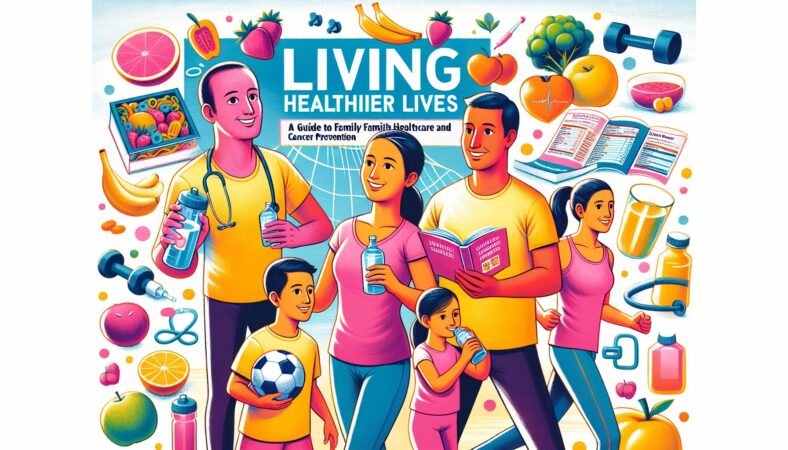Living a healthy lifestyle is a top priority for many families. The idea of providing optimal care for our loved ones is ingrained in our nature. One aspect of this care is ensuring that we prioritize our family’s healthcare needs. In this blog post, we will explore the importance of family healthcare and how we can take proactive steps to prevent one of the most prevalent and devastating diseases: cancer.
The Significance of Family Healthcare
Maintaining good health is the foundation for a fulfilling and happy life. Family healthcare plays an integral role in achieving this goal. By prioritizing regular check-ups, screenings, and preventive measures, we empower ourselves and our loved ones to take control of their well-being in a proactive and informed manner.
Regular visits to healthcare professionals, such as family physicians, dentists, and optometrists, are vital for preempting potential health concerns. These visits serve as opportunities to catch early signs of diseases, ensuring timely diagnosis and treatment plans. Through family healthcare, we can detect and address health issues before they escalate, potentially saving lives in the process.
Cancer Prevention: A Cornerstone of Family Healthcare
Cancer is a formidable adversary that has touched the lives of countless families worldwide. However, it is important to recognize that many forms of cancer are preventable. By adopting certain lifestyle changes and partaking in screenings, we significantly reduce the risk of developing this devastating disease.
A Healthy Diet: Nourishment for Prevention
The significance of maintaining a well-balanced diet cannot be overstated. A diet rich in fruits, vegetables, whole grains, and lean proteins serves as a powerful defense against various types of cancer. Encouraging our families to consume a diverse array of colorful fruits and vegetables ensures that they benefit from a wide range of essential vitamins, minerals, and antioxidants.
On the other hand, it is equally important to limit the intake of processed foods, sugary beverages, and excessive amounts of red and processed meats. By instilling healthy eating habits in our families, we reduce the risk of obesity, which is closely linked to several types of cancer, including breast, colon, and pancreatic cancer.
Regular Exercise: A Path to Wellness
Physical activity is an essential component of leading a healthy lifestyle. Engaging in regular exercise not only promotes cardiovascular health and maintains a healthy weight but also significantly reduces the risk of cancer development. Encouraging our families to participate in activities they enjoy, like walking, cycling, swimming, or dancing, can have a profound impact on their overall health and well-being.
Furthermore, limiting sedentary behaviors, such as excessive screen time or prolonged sitting, is crucial. Encouraging our loved ones, including children, to adopt active habits helps create a long-lasting positive impact on their health while reducing the likelihood of cancer-related complications.
Shielding Ourselves: The Importance of Sun Protection
One of the most preventable forms of cancer is skin cancer. Excessive exposure to harmful ultraviolet (UV) radiation from the sun or tanning beds is a leading cause of skin cancer. By teaching our families the importance of sun protection, we lay the groundwork for a lifetime of reduced risk.
Encouraging the application of broad-spectrum sunscreen, wearing protective clothing, hats, and sunglasses, and seeking shade during peak sun hours are simple yet invaluable practices. By taking these precautions, we safeguard our family members from harmful UV rays, minimizing their chances of developing skin cancer.
Regular Screenings and Vaccinations: Early Detection Saves Lives
Screenings and vaccinations are essential aspects of preventive healthcare. Familiarizing ourselves with recommended screening guidelines for various types of cancer can significantly enhance our family’s overall well-being. Breast, cervical, colorectal, and prostate cancer screenings, among others, are essential for early detection and prompt intervention.
Additionally, ensuring that our loved ones are up-to-date on their vaccinations is paramount. Vaccines, such as the human papillomavirus (HPV) vaccine, help prevent certain cancers that are linked to viral infections.
Conclusion
Prioritizing family healthcare and actively engaging in cancer prevention measures are powerful steps towards living healthier lives. By adopting a nutritious diet, participating in regular exercise, practicing sun protection, and staying updated on recommended screenings and vaccinations, we strengthen our family’s well-being and empower them to take control of their health.
Remember, prevention is always preferable to treatment. By investing in family healthcare and incorporating cancer prevention strategies into our daily routines, we can reduce the risk of cancer within our families and offer them a future filled with wellness and happiness. Let us commit to making these positive changes together to lead healthier, happier lives.
